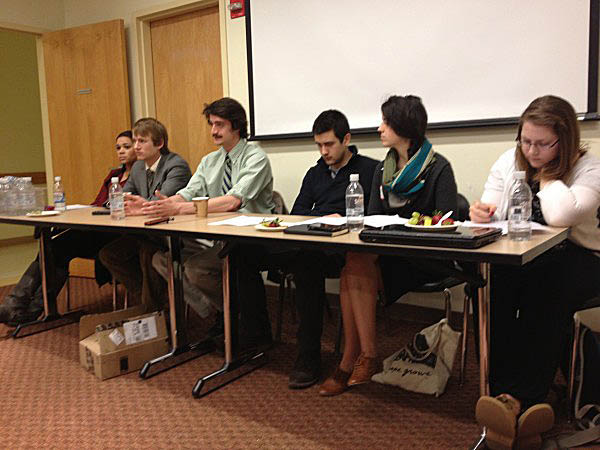
Immodest proposals: Students offer tips for fellowship success
Amidst the myriad student accomplishments abounding at this year’s Mount David Summit, a panel of five Bates seniors and one ambitious sophomore sought to pay it forward.

Students discuss the challenges and tactics of writing fellowship proposals at the Mount David Summit on March 29, 2013.
The March 29 panel, titled The Research and Writing of Strong Graduate Fellowship Proposals, offered students’ insight into the fellowship application process based on their recent experiences.
The panelists included Spencer Collet ’13 and James LePage ’13, recipients of a Davis Projects for Peace grant using new media training to address the conflict between Israel and Palestine; Daniel Peach ’13, recipient of an honorable mention for the Barry M. Goldwater Scholarship; Cameron Sheldon ’13 and Destinee Warner ’13, finalists for Fulbright English Teaching Assistantships; and Olivia Krishnaswami ’15, a 2012 recipient of a Davis Project for Peace grant with Natacha Danon ’15, to support women’s economic opportunities in rural India.
Robert Strong, lecturer in English and graduate fellowships adviser, moderated.
Below are eight tips from the panelists:
- Know your audience: For the highly technical Goldwater Scholarship, Peach made sure his tone remained formal and academic.
- Follow your passion: Successful proposals demonstrate a knowledge of or passion for a particular program or issue. For the Fulbright, Sheldon took the initiative to study the culture, history and politics of her chosen destination, Armenia. Krishnaswami’s grant evolved from a high school fundraiser she created.
- Start early: Warner began drafting her Fulbright application the summer before her senior year in order to prepare for the fall deadline — which unfortunately coincided with thesis work and other commitments.
- Show off your skills: Think about how prior leadership and extracurricular activities apply to your proposal.
- Stay flexible: “There are going to be unanticipated issues that you’re going to have to find a way around,” said Krishnaswami, so incorporate those into your proposal. She said having an “exit strategy” and budgeting for unexpected costs helped show the committee that she was planning ahead.
- Be concise: Many proposals limit you to a one- or two-page description of your project. Practice getting your proposal down to an “elevator pitch.”
- Revise, revise, revise: Take advantage of advisers and other resources like the Writing Center to get feedback on your proposal throughout the process. Bates maintains a Fulbright committee to support the program’s high number of applicants.
- Manage expectations: Collet recalled the stress of the days leading up to the final announcement. He recommended forgetting all about the proposal or finding ways to distract yourself. Once you submit your proposal, it is in the hands of the selection committee.
Warner reassured her fellow students that even if you are not selected for a fellowship, writing a proposal can be valuable preparation for the classroom and the working world.
“The experience of writing any proposal,” she said, “helps to strengthen the ability to conceptualize, write and follow through.”




